 Janus Head Janus Head
11.1&2

Travels Inside the Archive
Robert Gibbons
Edge of Maine Editions

Beyond Time
New & Selected Work
1977 - 2007
Robert Gibbons
 The Age of Briggs & Stratton The Age of Briggs & Stratton
Peter Culley
|
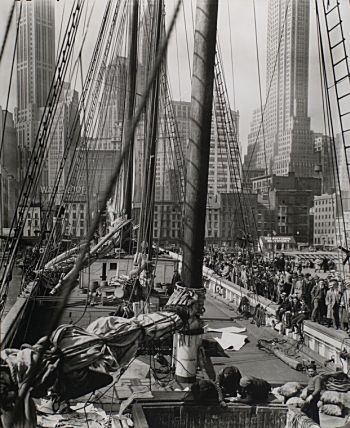
Pier 11 or 12
East River, Manhattan
(April 09, 1936)
Berenice Abbott
_______________________
The meaning of network culture
Kazys Varnelis
eurozine
If digital culture flourished during late capitalism, then it should not be surprising that Jameson observed that in that period, everything became interchangeable, quantified and exchangeable. With the gold standard done away with, capital would be valued purely for its own sake, no longer a stand-in for something else, but pure value. The result was the disappearance of any exterior to capital and with it the elimination of any place from which to critique or observe capital. As a consequence, postmodern culture lost any existential ground or deeper meaning. Depth, and with it emotion, vanished, to be replaced by surface effects and intensities. In this condition, even alienation was no longer possible. The subject became schizophrenic, lost in the hyperspace of late capital.
As capital colonized art under late capitalism, Jameson suggested, even art lost its capacity to be a form of resistance. The result was cross-contamination, as art became not just an industry but an investment market, and artists, fascinated by the market, began to freely intermingle high and low. With the art market calling for easy reproducibility and marketing, and with authenticity no longer a viable place of resistance, some artists began to play with simulation and reproduction. Others, finding themselves unable to reflect directly on the condition of late capital but still wanting to comment upon it, turned to allegory, foregrounding its fragmentary and incomplete nature.(....)
What of the subject in networked culture? Under modernism, for the most part, the subject is autonomous, or at least subscribes to a fantasy of autonomy, even if experiencing pressures and deformations from the simultaneity generated by that era's technologies of communication and by increasing encounters with the Other. In postmodernism, Jameson explains, these pressures couple with a final unmooring of the self from any ground as well as the undoing of any coherent temporal sequence, forcing the subject to schizophrenically fragment. With network culture, these shards of the subject take flight, disappearing into the network itself. Less an autonomous individual and more of a construct of the relations it has with others, the contemporary subject is constituted within the network.(....)
In network culture, then, the waning of the subject that began under postmodernism grows ever greater. But whereas in postmodernism, being was left in a free-floating fabric of emotional intensities, today it is found in the net. The Cartesian "I think therefore I am" dissolves in favour of an affirmation of existence through the network itself, a phantom individuality that escapes into the network, much as meaning escapes into the Derridean network of différance, where words are defined by other words, significance endlessly deferred in a ceaseless play of language. The division between the self and the net that Castells observed a decade ago is undone.
Nor are the networks that make up the contemporary self merely networks of people. On the contrary, they are also networks between people and things. In Bruno Latour's analysis, things are not merely objects that do our bidding but are key actors in the network. As things get smarter and smarter, they are ever more likely to make up larger parts of our "selves"....(more)
_______________________

Brad L. Graham
R.I.P.
Remembering Brad L. Graham
Anil Dash
Remembering our friend Brad
metafilter _______________________
Three ways to help Haiti
_______________________
Galactically vile Christian cleric Pat Robertson told his CBN viewers today that Haitians are "cursed" because their ancestors "swore a pact with the devil" to liberate themselves from the French in 1804. "True story."
What else would he say? Robertson can't let human suffering pass without finding a way to insinuate that God did it deliberately because he hates gay people, black people, Catholics, or whatever other poor dying sap he can find to cruelly mock and use to his own political and fundraising advantage.
- Gawker
_______________________
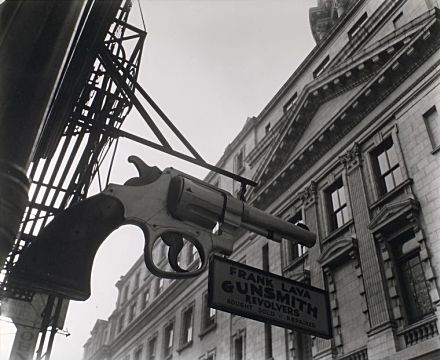
Gunsmith and Police Department
6 Centre Market Place, Manhattan
Berenice Abbott
(February 04, 1937)
_______________________
Palin: Crazy like a Fox News pundit
Bill O'Reilly introduces the rouged rogue to the media dog pile. Welcome to hell, Sarah
Heather Havrilesky
Time to state the obvious: Never before in the history of our country have there been more outlets for really stupid people with a lot to say. Blogs, Twitter, radio shows, talk shows, news shows -- a million and one blowhards pile on to the same story du jour, and our confederacy of dunces is dumber and louder than ever. We're a cacophony of phonies, rushing to judgment, vomiting witty and caustic bons mots while the cameras roll and the clocks tick, gumming up the internets with our thoughtless reaction pieces. (Ahem.)
So how could a self-congratulatory dim bulb like Sarah Palin resist joining the idiot party?...(more)
_______________________
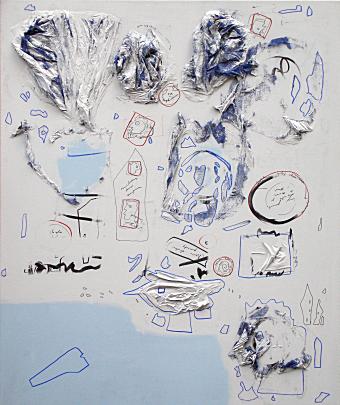
ambient cover
Grzegorz Wroblewski
Cleaves Journal
issue one
If I had been in my dream last night
Louise Rosengreen
Translated by Rasmus Emil Mikkelsen and Louise Rosengreen
Cleaves Journal
(....)
If I had been in my dream last night
Martin Luther King would have nailed a recipe
On how humans should be
To my front door.
It would have been in passive
Like recipes and humans are most.
...(more)
_______________________
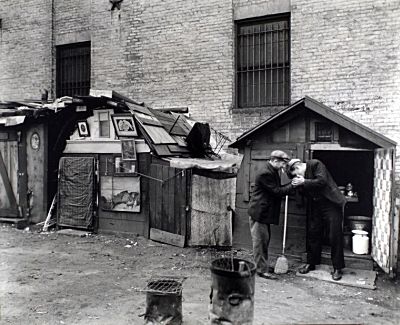
Changing New York, 1935-1938
Berenice Abbott
(1898-1991)
NYPL Digital Gallery
From automata to tavola rustica
Tom Matrullo IMproPRieTies
The thingliness of dead protocols just makes them more dead, doesn't it? But then there's the return of all that in archives available to all - (those that are "private" are simply JSTORized out of common reality) - e.g., in this magnificent NYPL collection of Abbott photos of New York of the 30s(....)
The arc of that time - dazzling technological innovation taking place in a time of impoverishment -- putting mechanical turks behind columbaria of nourishment so as to make the users seem empowered, the workers seem invisible, and the delivery of what was to be consumed appear a sort of humorous point-and-click anticipation of what we now consider pretty nifty technology -- an arc of technological advance which, by 1965, had arrived at a state of seedily dehumanized, tinfoil-hatted industrial inspiration.(....)
Neither the emblazoned Tavern nor the Foodomat seem especially appealing, comfortable, or contemporary, though for completely opposed reasons. But with these guys, I could feel at home.
...(more)
_______________________
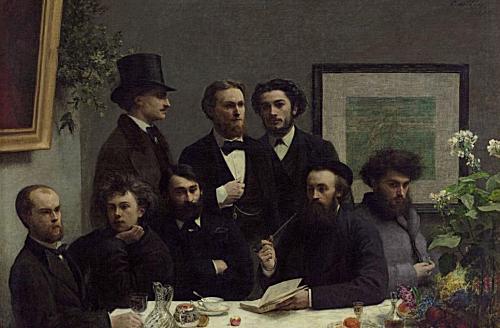
Henri Fantin-Latour
b. 14 January 1836

Louis Stettner
1956
_______________________
Notes on the gnostic historian
Roger Gathman
news from the zona
There is a certain kind of skepticism that nests like an ominous crow in the branches of cultural relativism. It is aimed at all the myths and motifs that are used in the hegemonic strata of Western intellectual life – or, taking the nuts and bolts out of my mouth, by orthodoxy, by everything that cultural relativism, since Herder, has sought to take down – Western superiority, a narrow sense of reason, a vulgar notion of progress, all of it. Thus, in the sixties and seventies, when cultural relativism was particularly strong, there were a number of claims that such diverse social phenomena as the practice of cannibalism or the Mafia or European witchcraft were myths. They didn’t exist. There are powerful reasons to take this point of view, as almost always, the existence of the phenomena in question legitimate various forms of repression by established power....(more)
_______________________

Boonville
Timothy Briner
via The Exposure Project
_______________________
Performing Its Own Self
Daniel Green on Raymond Federman
... ulimately what a work like Double or Nothing dramatizes is that the "truth" of fiction lies not in its fidelity to external events but to its own necessities. Federman uses his own "life experiences" as material on which to perform the imaginative turns fiction always performs, but in Federman's case the performance is made "concrete," conducted on the page without disguise. Double or Nothing is the epitome of that modern/postmodern text that, in Jerzy Kutnik's words, "not so much says something about reality but, by its occurence and presence, does something as a reality in its own right." I would add to this that it is a literary text that is allowed to "be something" as well. In both its emphasis on "performance" and its ultimate status as an object of aesthetic perception, Double or Nothing is less a rendering of experience (at least as a realistic representation of "life") than it is an experience "in its own right." In its very refusal to accept the established practices determining where the "art" of fiction is to be found, Double or Nothing establishes itself as art in the most compelling way possible, by providing the reader with a unique aesthetic experience....(more)
via Mark Thwaite
_______________________
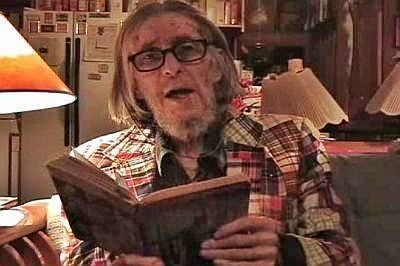
Greenwich Village of my Dreams
Tuli Kupferberg
part 1 and 2
vimeo
.....................................................
Benefit for Tuli Kupferberg
January 22, 7:30pm
St. Ann's Warehouse
38 Water St, Brooklyn, NY 11201
Sonic Youth
Jeff Lewis
Lou Reed
John Zorn Trio
The Fugs
Produced by Hal Willner
_______________________
Plasma
Barrett Watten
1979
A paradox is eaten by the space around it.
I’ll repeat what I said.
To make a city into a season is to wear sunglasses inside a volcano.
He never forgets his dreams.
The effect of the lack of effect.
The hand tells the eye what to see.
I repress other useless attachments. Changes of survival are one out of ten.
I see a tortoise drag a severed head to the radiator.
The lost their sense of proportion. Nothing is the right size.
He walks in the doors and sits down.
The road turns into a beautiful country drive.
The voice isn’t saying something, but turning into things.
...(more)
_______________________
The Conservatives seemed increasingly cornered and unhinged. Their stonewalling led the often-divided opposition to unite in passing a parliamentary motion demanding the documents, putting the government in a possible legal battle with Parliament.
Harper was starting to look like Richard Nixon refusing to hand over the Watergate tapes. (But perhaps that's an unfair comparison. After all, no one was tortured in the Watergate scandal.)
Conservative supporters are trying to divert attention, asking irrelevant questions like: didn't the Liberals also prorogue Parliament, how many days a year must Parliament sit, does it matter if it sits at all?
- Linda McQuaig
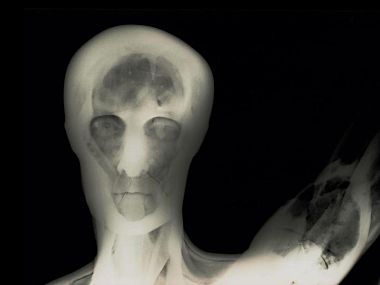
History`s Shadow GM1
David Maisel
_______________________
Self-poisoning of the mind
Jon Elster
In this paper, I shall discuss what Scheler (1972), inspired by Nietszche, called ‘self-poisoning of the mind’. I shall not limit myself to the ‘ressentiment’ that was Scheler's main example, but also consider other counterhedonic mental mechanisms—belief changes or preference changes that originate in the agent and make her worse off. I shall draw heavily on the writings of Marcel Proust, which provide many insights into these matters.
Philosophical Transactions Bspecial issue on rationality and emotions Royal Society Publishing
_______________________
The globalization of biopsychiatry
Eugene Raikhel's reaction to The Americanization of Mental Illness by Ethan Watters
I think that Downey’s argument—that psychiatric knowledge or technologies don’t get exported in isolation, but are part of a deluge of cultural artifacts, scripts, commodities, institutions—leads us to another very important set of issues, which might be summarized as “How should anthropologists and cultural psychiatrists deal with this kind of complexity?” Is it enough to gesture toward complexity, calling it a “flow” or an “assemblage” and listing its various elements (as I’ve done above), or should we try to understand the various specific mechanisms through which what we often call macro-processes (like “globalization” or “industrialization”) shape the ways individuals experience and articulate their distress?...(more)
_______________________

History’s Shadow
David Maisel
fraction - issue 10 : All About The Face
_______________________
“your darkness also/rich and beyond fear”: Community Performance, Somatic Poetics and the Vessels of Self and Other
Petra Kuppers
M/C Journal
How do you disclose? In writing, in spoken words, in movements, in sounds, in the quiet energetic vibration and its trace in discourse? Is disclosure a narrative account of a self, or a poetic fragment, sent into the world outside the sanction of a story or another recognisable form?
These are the questions that guide my exploration in this essay. I meditate on them from the vantage point of my own self-narrative, as a community performance practitioner and writer, a poet whose artistry, in many ways, relies on the willingness of others to disclose, to open themselves, and yet who feels ambivalent about narrative disclosures. What I share with you, reader, are my thoughts on what some may call compassion fatigue, on boredom, on burn-out, on the inability to be moved by someone’s hard-won right to story her life, to tell his narrative, to disclose her pain.
(....)
This essay speaks about how I witness the uncapturable in performance, how the limits of sharing fuel my performance practice. I also look at the artistic processes of community performance projects, and point out traces of this other attention, this poetics of vibration. One of the frames through which I construct this essay is a focus on the formal in practice: on an attention to the shapes of narratives, and on the ways that formal experimentation can open up spaces beyond and beneath the narratives that can sound so familiar.
An attention to the formal in community practice is often confused with an elitist drive towards quality, towards a modern or post-modern play with forms that stands somehow in opposition to how “ordinary people” construct their lives. But there are other ways to think about “the formal,” ways to question the naturalness with which stories are told, poems are written, the ease of an “I”, the separation between self and those others (who hurt, or love, or persecute, or free), the embedment of the experience of thought in institutions of thinking. ...(more)
M/C Journal, Vol. 12, No. 5 (2009) - 'disclose'
Negotiating Selves: Exploring Cultures of DisclosureBree Hadley, Rebecca Caines
In this issue of M/C Journal, contributors from the U.S., U.K., and Australia consider the personal, professional and social consequences of disclosure in autobiographical art, community art, online media, and a range of other communicative and cultural practices. Approaching the topic from the perspective of those who disclose, and from the perspective of those who interpret disclosures by or about others, the contributors raise a range of questions about the way in which individuals are currently negotiating the difficult, risky business of disclosure. The articles develop a diverse, yet surprisingly coherent, body of theorisation, constantly returning to the motivations that underpin disclosure, the way disclosure can be interpreted or coopted by others, and, as a result, an overarching concern with the modes, mechanisms and contexts, rather than the content, of disclosure.
_______________________
Black crocus
Lakshmi Krishnan
exquisite corpse
I was born with a black crocus above my head
Its leaves perpendicular
penetrative, splendidly thornish like a knuckle
intersected at the joint
perfectly straight but bony, spinish as
an anemone cross.
My bed until five
Was a solvent cradle, a billowing sea under its varnished arc
Or if night was slow, a deep swamp
that as we stepped made a sucking sound
a squelch of derision
Its night was a sign, sparse and tortuous
As a subverted swastika.
What dreams lurked under its lurid neon twists
Flashing like a mob sparkling in a shower that left more
Dry than wet,
Flashing like the crowd on the High
Whose shades, belts, gold clinks and ear pieces wear better than
Serpent scales or green and gold or meso-flags strung across
Confederate hideouts. That swarm in red in naval blue in worn white.
Baby, sleep. Lullabies are words paramount
Sweet as balm, soft as air, delirious
As a kite wheeling across the sky, shrieking craven
insults into the clouds.
Four Poems
Lakshmi Krishnan
_______________________

Naomi Vanderkindren
glass-plate negative and tintype
via
_______________________
The Implosion of the American Political Consciousness
David Michael Green
_______________________
How dysfunctional is our nation? These days, we lie to ourselves perhaps as badly the Soviets did, and in a worse way, because where information is concerned we really are a freer people than they were, so our failure is far less excusable, far more disgraceful. That you are reading this blog is proof that we still enjoy free speech in this country, whatever state of captivity or foolishness the so-called "mainstream media" may be in. By submitting to lies and illusions, therefore, we are discrediting the idea that freedom of speech and action has any value. How dangerous is that?
- James Howard Kunstler
_______________________
Taking Tea with the Lizards
Joe Bageant
Presently surfacing from the frothing drek we call our political system is a thing called the Tea Party. Whether advertised as such or not, the Tea Party is viewed by millions as an emerging third party, or the functional equivalent of one. In some dark recess of the American consciousness -- hard to tell which one because it's all darkness and recession -- millions have figured out that nobody is getting what they want or need from Congress, except the corporations that own Congress. Actually, dedicated voters on the far right are getting exactly what they have voted for -- a police state -- but do not recognize it yet. No matter. Millions are unhappy and one way or another, think a third party, or the threat of one at least, offers a solution. And how could you go wrong with a brand evoking hallowed images from Ms. Jenkins fourth grade history class of the Boston Tea Party?
The Tea Party is the latest neoconservative end run around the possibility of a real third party emerging to threaten the status quo.(....)
The sad truth is that the pent up emotion has little to do with feelings about health care, or taxes (when the hell has any working American not been against any kind of taxes?) but a helluva lot to do with all the shitty breaks, insult and degradation that come with being an underclass citizen of the empire. We are conditioned in much the same way a dog is trained to bite on command. It doesn't matter who gets bitten, just that the dog gets the satisfaction of biting somebody for a change, and that his master looks pleased when he does.
Widely televised, these anti-reform screamers provide the necessary theatrics for media consumption in an ideological theater state. Hopped up by anti-reform forces, they do what millions in PR money cannot do, but what only word of mouth misinformation can accomplish with unnerving swiftness -- sew lies and misinformation, let it spread virally until it can no longer be ignored, then give the lies credibility by plastering "citizen outrage" across the nation's television screens day after day. ...(more)
_______________________
Learning From Europe
Paul Krugman
The real lesson from Europe is actually the opposite of what conservatives claim: Europe is an economic success, and that success shows that social democracy works.
_______________________
First Prorogue, then Eviscerate
Murray Dobbin
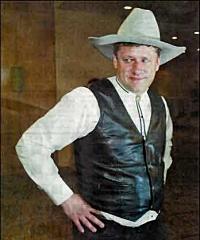 There is, for good reason, a lot of enthusiasm across the country as the groundswell against Stephen Harpers' cynical shuttering of Parliament continues to grow. The prime minister from hell has gotten away with so much -- and the opposition is so weak that any indication of genuine public disgust at his continuing demonstration of contempt for democracy is a welcome sign. And everyone who cares about the country should be taking part in the new movement for democracy. There is, for good reason, a lot of enthusiasm across the country as the groundswell against Stephen Harpers' cynical shuttering of Parliament continues to grow. The prime minister from hell has gotten away with so much -- and the opposition is so weak that any indication of genuine public disgust at his continuing demonstration of contempt for democracy is a welcome sign. And everyone who cares about the country should be taking part in the new movement for democracy.
But we should also be careful that this issue does not totally distract us from Harper's actual agenda which is still exactly as it has always been -- to dismantle the Canada so painstakingly built by two generations of Canadians. In March, Harper will present his first "austerity" budget. It could prove to be more damaging than the proroguing of Parliament.
Harper is driven by a visceral hatred of what we once referred to as the welfare state. Most people in this world of information overload and 20 second sound bites have probably forgotten that Mr. Harper once ran the National Citizens Coalition (NCC), one of the most right-wing, libertarian organizations in the country -- founded by an insurance broker determined to rid the country of Medicare....(more)
_______________________
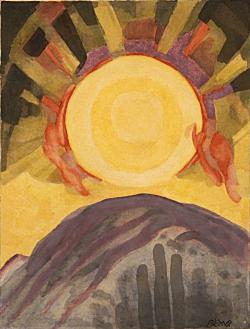
Sunrise And Mountain
1928
Oscar Bluemner
1867 - 1938
_______________________
Just Like Heaven
Paul Ford
the morning news
(....)14.
There are moments that come to me in the shower. Emotions combine in certain alchemical ways and bring upon me a desire to fall to my knees, heart pregnant with celestial fire. I am ready to subjugate myself to the sky sprites; prepared to say, “Not my will, but Thine.” But, sadly, I am apostate. I don’t believe.
15.
My mother lives in the panhandle of Maryland, near West Virginia. I visited her not long ago and we went to her small hilltop Methodist church. The service was halfway between evangelical (PowerPoint) and mainstream (hands clasped, not raised, in prayer). The minister spoke against internet pornography and warned of the unchecked rise of godlessness. Darwin was not in fashion there. The pews were half-full. When they passed the plate I put in $5. It’s not atheism keeping people at home....(more)
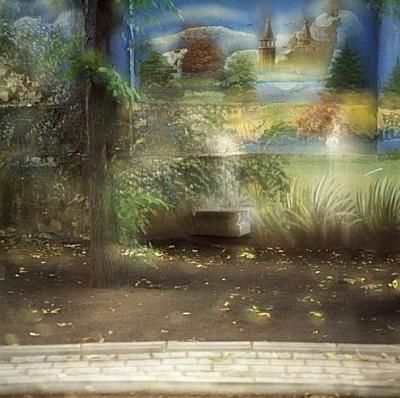
Uncanny Places
Virgilio Ferreira
_______________________
Yi-Fu Tuan Essay Collection
aaaarg
Images and Mental Maps
Annals of the Association of American Geographers, Vol. 65, No. 2. (Jun., 1975)
In the last fifteen years geographers have shown increasing interest in mental phenomena. l Perhaps no branch of human geography is now wholly innocent of what might be called a psychological perspective. With the new interest comes a new vocabulary. In geographical writing as in the literature of planning, architecture, and urban sociology, words such as perception, image, cognitive structure, perceptual space, schema, and mental maps occur with mounting frequency. What do these words mean? They are not neologisms. They look familiar, and perhaps for this reason writers who are not professional philosophers or psychologists tend to use them without earnest effort to clarify the words' meaning and importance. Image, for example, is an artificial likeness or picture of an object; it is also a percept sustained by current sensory input, a mental picture in the memory, and furthermore it could also mean a people's schematic and indirect knowledge of place, as in the expression "the European's image of the New World." Mental map may be the street plan a person recalls as he gives directions to a friend, or it could be the geographer's cartographic representation of people's attitudes toward place.
Words like image and mental map are loosely and variously defined. Have they become poetic metaphors kept in use out of habit, or do they in fact capture important facets of human geographical behavior? The purpose of this paper is to show that mental events are elusive but not ineffable, that they justify a rather special vocabulary, and that their study contributes fundamentally to the understanding of human activities in space.
_______________________

Garden Of Knowledge
Heidi Romano Heidi Romano blogs at Tales Of Light and is featured in
Unless You Will - issue 3via The Exposure Project
_______________________
Riley and his story.
Me and my outrage.
You and us.
A project by Monica Haller
This is an invitation, a container for unstable images, a model for further action. Here is the formula: Riley and his story. Me and my outrage. You and us.(....)
Art can be a series of acts and challenges. Currently the artwork is an object in your hand — organized, mobile, tactile — a stable site to see information once elusive. The artist can mobilize information by provoking, listening, imagining, organizing and reorganizing. Right now, I am the artist. I want you to see what this war did to Riley. Alec Soth talks to Monica Haller Little Brown Mushroom - vimeo
_______________________
Imaginary Encounters: Walter Benjamin & the Aura of Photography
Carolin Duttlinger
aaaarg - free reg. req.
Abstract
This article explores Walter Benjamin’s famous concept of the aura in relation to his writings on photography. Although Benjamin’s “Artwork” essay charges photography with the decline of the aura of the traditional artwork, his essay on photography complicates this historical narrative, associating aura with early portrait photography but also with its successor, the commercial studio portrait. The childhood photograph of Franz Kafka, whose melancholy air serves Benjamin as an example of a paradoxical, post-auratic aura, recurs in his childhood memoirs, where the narrator projects himself into this picture. Benjamin’s writings on photography thus develop an alternative concept of aura, one which transcends fixed historical or technological categories through the model of an imaginary encounter between viewer and image. This conception has far-reaching consequences not only for the theory of photography but also for its role within literature, as is suggested by Benjamin’s empathetic engagement with the Kafka photograph and its incorporation into his own life story.
_______________________

St. Bernard Parish Cemetary
Louisianna, 2005
Alan Chin
Sasha Wolf Gallery
_______________________
The Tragedy of Happiness
Revisiting a philosopher's ambivalent thoughts about his prosperous adopted home—America.
Thomas Meaney
For its Rethinking the Western Tradition series, Yale University Press has republished two major Santayana works, "The Genteel Tradition in American Philosophy" and "Character and Opinion in the United States," together with essays by four contemporary commentators, including the book's editor, James Seaton. It is a brief, thought-provoking volume that allows us to revisit Santayana's elegant prose and re-engage his thoughts about American culture.
Santayana's major insight was that America was "a young country with an old mentality" or "old wine in new bottles." The "old wine" was the unfiltered Calvinism that the Puritans brought with them to New England, where they expected their experience to bear out the harsh tenets of their faith. The problem, according to Santayana, was that their material success outpaced their theological pessimism....(more)
_______________________
The Americanization of Mental Illness
Ethan Watters
“We might think of the culture as possessing a ‘symptom repertoire’ — a range of physical symptoms available to the unconscious mind for the physical expression of psychological conflict,” Edward Shorter, a medical historian at the University of Toronto, wrote in his book “Paralysis: The Rise and Fall of a ‘Hysterical’ Symptom.” “In some epochs, convulsions, the sudden inability to speak or terrible leg pain may loom prominently in the repertoire. In other epochs patients may draw chiefly upon such symptoms as abdominal pain, false estimates of body weight and enervating weakness as metaphors for conveying psychic stress.”(....)
There is now good evidence to suggest that in the process of teaching the rest of the world to think like us, we’ve been exporting our Western “symptom repertoire” as well. That is, we’ve been changing not only the treatments but also the expression of mental illness in other cultures. Indeed, a handful of mental-health disorders — depression, post-traumatic stress disorder and anorexia among them — now appear to be spreading across cultures with the speed of contagious diseases. These symptom clusters are becoming the lingua franca of human suffering, replacing indigenous forms of mental illness....(more)
_______________________
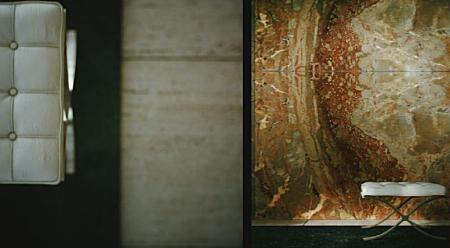
The Third & The Seventh
Modelling - Texturing - Illumination - Rendering| Alex Roman
vimeo
via enthusiasm (a novelty choking hazard)
_______________________
Letter to the New Left
C. Wright Mills
1960
... reasoning collapses into reasonableness. By the more naïve and snobbish celebrants of complacency, arguments and facts of a displeasing kind are simply ignored; by the more knowing, they are duly recognised, but they are neither connected with one another not related to any general view. Acknowledged in a scattered way, they are never put together: to do so is to risk being called, curiously enough, “one-sided.”
This refusal to relate isolate facts and fragmentary comment with the changing institutions of society makes it impossible to understand the structural realities which these facts might reveal; the longer-run trends of which they might be tokens. In brief, fact and idea are isolated, so the real questions are not even raised, analysis of the meanings of fact not even begun.
Practitioners of the no-more-ideology school do of course smuggle in general ideas under the guise of reportage, by intellectual gossip, and by their selection of the notions they handle. Ultimately, the-end-of-ideology is based upon a disillusionment with any real commitment to socialism in any recognisable form. That is the only “ideology” that has really ended for these writers. But with its ending, all ideology, they think, has ended. That ideology they talk about; their own ideological assumptions, they do not.(....)
If the phrase “the end of ideology” has any meaning at all, it pertains to self-selected circles of intellectuals in the richer countries. It is in fact merely their own self-image. The total population of these countries is a fraction of mankind; the period during which such a posture has been assumed is very short indeed. To speak in such terms of much of Latin America, Africa, Asia, the Soviet bloc is merely ludicrous. Anyone who stands in front of audiences — intellectual or mass — in any of these places and talks in such terms will be shrugged off (if the audience is polite) or laughed at out loud (if the audience is more candid and knowledgeable). The end-of-ideology is a slogan of complacency, circulating among the prematurely middle-aged, centred in the present, and in the rich Western societies. In the final analysis, it also rests upon a disbelief in the shaping by men of their own futures — as history and as biography. It is a consensus of a few provincials about their own immediate and provincial situation....(more)
via the yolk
_______________________
First Prorogue, then Eviscerate
Harper's agenda has a simple goal: destroy the Canadian social safety net.
Murray Dobbin

General view of the hump
Chicago, Ill.
1942
Jack Delano
1930s-40s in Color
(LOC)
_______________________
The tragedy of the capitalist commons
Massimo De Angelis
turbulence
Capitalism as a socio-economic system has a schizophrenic relationship to the commons. On the one hand, capital is a social force that requires continuous enclosures; that is, the destruction and commodification of non-commodified common spaces and resources. However, there is also an extent to which capital has to accept the non-commodified and contribute to its constitution. The degree to which it does so, and how it does so, is fundamental for its own sustainability and preservation. But it also has fundamental consequences for the sustainability and preservation of the planet and of many communities. Capital has to reconcile itself to the commons to some degree precisely because capitalism – as the set of economic exchanges and practices mediated and measured by money and driven by self-interest, economic calculus and profit – is not all-encompassing. Capitalism is itself a subsystem of far larger systems necessary for the reproduction of life. This in turn implies that capitalism always finds itself trapped within a shell that constitutes its presuppositions, whether ecological or in terms of non-commodified life practices (non-remunerated childcare, education, etc.). Capital constantly strives to escape this entrapment, to overcome the barriers that constitute it and, through this, to preserve and reproduce itself through perpetual growth.
For capital to now reconcile itself to the commons in order to overcome barriers to its own development, it has to strategically (driven by peoples’ economic and political calculus) intervene and actively participate in the constitution of things shared. In other words, the forces of capital must participate in the constitution of the commons. And this is where capital’s troubles, and everybody else’s, begin....(more)
Turbulence 5via P2P Foundation
_______________________
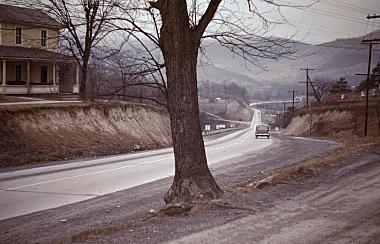
Road out of Romney
West Va.
[1942 or 1943]
John Vachon
1930s-40s in Color
(LOC)
_______________________
Identi-kit
Veronica Forrest-Thomson
Love is the oldest camera.
Snap me with your eyes.
Wearied with myself I want
a picture that simplifies.
...(more)
KROnline Web Feature: Veronica Forrest-Thomson
Kenyon Review Online twelve poems and five critical essays
via NewPages Blog.....................................................
Poetic Artifice: a theory of twentieth-century poetry
Veronica Forrest-Thomson
on google books or pdf (aaaarg) .....................................................
Feature: Veronica Forrest-Thomson, 1947–1975
jacket .....................................................
Antiquities
Veronica Forrest-Thomson
A gesture is adjective,
two hands, granite
when they turn bread to flesh
(Notre Dame, July 14th)
A mirror is a museum-case,
two hands, priestesses'
when she mummifies her face.
Emotion is a parenthesis,
two hands, irony
when I light the candle
and cross myself.
Aesthetic approbation is glass
when it encloses her faience eyes
and gilded skin.
(Musée du Louvre, July 18th)
Glance is the copula
that petrifies our several identities,
syntactic superficies.
II
(....)
The glamorous grammatical frames
captions for a monograph on non-
existent plates. Glue, paper,
scissors, and the library together
paste a mock-up of an individual
history. The art of English Poesie?
"Such synne is called yronye."
...(more)
_______________________

photo - mw
_______________________
If It Could Be Wrapped
Joseph Mcelroy
excerpted from Water Writing - an essay
electronic book review
I pour into water like a leaky vessel what values come to me (a habit obviously one of our properties surfacing in us) admired, reproduced, curative, echoing, a depth not superficial but in practice depth upon depth to build on. Isn't water fluidity itself? - fluidity itself, a perfect motion, seamless texture; dangerous (because you don't want to interrupt fluidity yet you don't want to be taken over by yourself or style), changeable, half invisible, unless we stop and look, which you have the right to think water "teaches" us to do - recalling the early-6th-century B.C. thinker (and statesman!) Thales who we think imagined that everything is water: which also meant, Forget mythology (with, as Anaxagoras suggested, its monarchical vocabulary), while encouraging solider Aristotle to think Earth alive.
Fact and subject, glittering, light, dark, steely, already too encompassing: but while the truism attributed to Heraclitus is technically so, the reverse is, too - you always step into the same river, like the Teacher who can't help repeating himself, or writer, or physician. In rivulets and drains, in a drop in the bucket or from a faucet a drop stretched in its stronger-than-rubber skin till it lets go to cohere in "of all possible shapes the one having the least surface for a given volume." Workable surface and depth a nearly unique union that may be dark or hiding something important makes water drop or swing through the mind.
I am at sea (something like what is in us); in bay, lake, or like the Hudson and East (so-called) "rivers" that I grew up with and neither of which I ever recall stepping into: estuaries salt and fresh sometimes flowing both ways bringing ten-pound striped bass to city fishermen casting their bait with a good heavy rod into the Hudson from the parking lot at 125th Street, several rods propped against the railing as my bike coasts past.
But no turning back - I've just begun. Yet have not at my age the right - who gave me this slippery non-right? - to be unclear. At least when I get to where I want to go. By hearing what I say and building on it. For example, that water can hardly belong to us because it is everywhere in us. (....)
Yes, a walk in the woods or along the river; finishing a table top, making a floor; repairing a bark canoe with pitch or pine gum. Reading, though, as Experience: the book as distillation (I don't mean, into desalinated water vapor): the book as... revision. What Homer even in translation means to a reader of twenty or twenty-one: "...a new planet swims into his ken." Some of my experience, like Keats', is through books. (Isn't yours?) Some? Novelists more than they like to admit. A line, a sentence, a scene, an impression of a whole book continuing for years.
Primo Levi's novel The Periodic Table describes his young ambitions in science: to "grab Proteus by the throat" and "cut short his inconclusive metamorphoses from Plato to Augustine...Hegel to Croce...force him to speak." In an improvised lab at first, "at the rear of a courtyard, in a curious, narrow, twisting alleyway which branched off Piazetta della Crocetta and stood out in the obsessive Turinese geometry like a rudimentary organ trapped in the evolved structure of a mammalian."
Why does this passage touch me? ...(more)
critical ecologieselectronic book review
via with hidden noise
_______________________

Central Park, The Mall II
New York Sleeps
Christopher Thomas
Steven Kasher Gallery
via
Christopher Thomas Photography
_______________________
New Media Critical Homologies
Brian Lennon
pmc
New media studies, we might say, has discovered temporality. After fifteen years in which its cultural dominant was presentist prognostication, even --often enough --a kind of bullying, the field has folded on itself with such new guiding concepts as the "residuality," the "deep time" or "prehistory," and the "forensic imagination" of a new media now understood as after all always already new. This is a more absorbent fold, perhaps, than that embedded in one of the field's originary figures, "remediation" --a determinedly modern progressive figure, though one whose conceptual plasticity always suggested the possibility, beyond linear reframings, of non-modern medial cycles or folds (see Bolter and Grusin). Without a doubt, it is that depth that sends us searching, now, for a reading of the temporal turn that seems all at once to discard and even undermine the prime rhetoric of a field of study settled in self-establishment. Read symptomatically, there is perhaps more to all of this than the usual need for professional distinction in the field itself, which like any mode of absorption of surplus, needs a manufactured boom and bust, on a regular cycle. To the shaming of the slow, the skeptical, and the self-respecting who refuse the unfunded mandates of technocratic reactivity, in the New Economic home-classroom-office pod of unrelievedly public life online, new media studies now adds to its figural repertoire a synchronic complement, in the reflection of what the Jameson of the 1970s, writing Marxism and Form, calls the "commodity structure of academic intellectual life"....(more)
Post Modern Culture
Volume 19, Number 2
_______________________

photo - mw

photo - mw
_______________________
To keep photographing the same ice
In the same river flowing beneath the same bridge
Tying to link the shadow of a word to another word
Staring into the same sign of signs for nothing.
-
David Shapiro, "The Sphinx, Again"
.....................................................
Written and Rewritten to Order:
The Gift of Generative Possibility in the Work of David Shapiro
Noah Eli Gordon
.....................................................
After Three Chinese Poems
for Mr. Cong
One word tied to another word — that is all
You know. No cherryblossoms. In this world
The hospice workers visit the dead child.
His lack of a voice startles the sleeping words.
This world, fold upon fold.
Is there a better title for it?
Letting Go, Griefwork, Brightness Falls from the Air,
All the Angels Were There. She said it.
All night I think about my sister.
Galileo plunged into Jupiter.
O clear poetry!
No dust tonight.
Six poems from A Burning Interior
David Shapiro
David Shapiro feature - Jacket 23
_______________________

CityPoem 70 - Copenhagen
Inger Christensen
Inspiring Cities Museum of CityPoems
Alphabet
Inger Christensen
7
given limits exist, streets, oblivion
and grass and gourds and goats and gorse,
eagerness exists, given limits
branches exist, wind lifting them exists,
and the lone drawing made by the branches
of the tree called an oak tree exists,
of the tree called an ash tree, a birch tree,
a cedar tree, the drawing repeated
in the gravel garden path; weeping
exists as well, fireweed and mugwort,
hostages, greylag geese, greylags and their young;
and guns exist, an enigmatic back yard;
overgrown, sere, gemmed just with red currants,
guns exist; in the midst of the lit-up
chemical ghetto guns exist
with their old-fashioned, peaceable precision
guns and wailing women, full as
greedy owls exist; the scene of the crime exists;
the scene of the crime, drowsy, normal, abstract,
bathed in a whitewashed, godforsaken light,
this poisonous, white, crumbling poem
...(more)
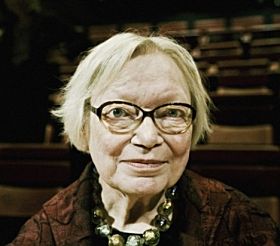
Inger Christensen
(16 January 1935 – 2 January 2009)
Alphabet
Inger Christensen
translated by Susanna Nied
google books
Pierre Joris on Inger Christensen
_______________________

Noah Sheldon
Remnants of the Biosphere
Geoff Manaugh on the
Photographer Biosphere 2 photographs of Noah Sheldon
BLDGBLOG
Sheldon's images, reproduced here with permission, show the facility—the largest sealed space ever constructed—advancing into old age. A vast biological folly in the shadow of desert over-development, the project of Biosphere 2 seems particularly poignant in this unkempt state.
The fertile promise of the microcosm has been abandoned.
In this context, Biosphere 2 could be considered one of architect Francois Roche's "buildings that die," a term he used in a recent interview with Jeffrey Inaba. Indeed, in its current state Biosphere 2 is easily one of the ultimate candidates for Roche's idea of "corrupted biotopes"; the site's ongoing transformation into suburbia only makes this corruption all the more explicit. ...(more)
_______________________
On The Many Who Search for "Wealth Bondage"
Phil Cubeta
(....)You of all people ask where Wealth Bondage is. It lives in the Ad Sense supporting every blog. It lives in the business model of the mendacity and timidity and bombast we have come to call the news. It lives in the unholy coupling of Wall Street and Government. The scene rooms of Wealth Bondage are the movie theaters and the video games and sitcoms and the reality TV your children watch. Wealth Bondage binds debtor and creditor. Wealth Bondage blesses Bride and Groom. Wealth Bondage accompanies the Bishop to the Christening. Wealth Bondage sells the Groom the ring, and Wealth Bondage sells the caskets in which the couple, long since divorced, will be buried. Wealth Bondage writes the Last Will and Testament of everyone who has one. Wealth Bondage sells the financial planning software, manages the investments, pays the advisor his commission, pays the attorney who pays the paralegal, who punches the buttons in the Wealth Bondage Legal Document Creation System. Wealth Bondage builds the casino, Wealth Bondage has a TV show glorifying the gambler, Wealth Bondage runs the Pawn Shop beside the Casino. Wealth Bondage has a TV show glorifying the Pawn Shop. Wealth Bondage is what you call Freedom. Wealth Bondage is every addiction. Wealth Bondage is the TV show about celebrity addicts and their celebrity doctor. Wealth Bondage is depression, anomie, despair. Wealth Bondage is the baby born already high on Prozac. Between cause and effect Wealth Bondage provides the miscues. Where Wealth Bondage produces cancer from the factory upstream it also produces a white paper from the Think Tank proving otherwise. Where Wealth Bondage tortures an innocent man it calls it enhanced interrogation of an enemy combatant. Where Wealth Bondage expropriates assets, it calls it liberation. Where Wealth Bondage enters your life it becomes invisible.
You never heard of Wealth Bondage? Wealth Bondage is the nipple you suckled upon, the hand that rocked your cradle, the swaddling bands that held you when you thrashed. Wealth Bondage is the objective test you took to demonstrate competence from kindergarten up until obedience in thought word and deed became inveterate. Wealth Bondage is weaving your funeral shroud. Wealth Bondage will preach the Eulogy.(....)
Through Wealth Bondage I heal the world, starting with you, if all has gone well in this particularly fine post. I trust I have given no offense. I mean only to advance your Personal Journey. May you reach the destination towards which you are now embarked by the widest of roads, and with the greatest alacrity: Wealth Bondage forever. May you mistake it for freedom and so be spared the anguish of the damned.
I hope this clears the air. ...(more)
Gift Hub
Pronounced Gift Tub; remember the h is silent
_______________________
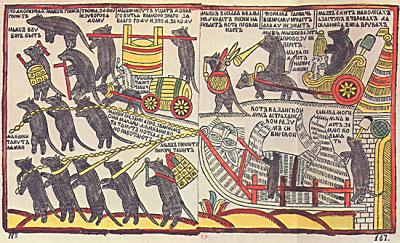 Mice celebrating funerals to the cat.
Satyric lubok on the funerals of Czar Peter the Great
and on the relief of the nobility.
Moscow, c. 1760.
Modern luboks
Studiolum
Poemas del río Wang
_______________________
Bibliomancy
Miriam Bird Greenberg
42opus
(....)
They are studying bones. They are drawing lots.
They are observing patterns in the
flight of birds.
They are rereading their diaries,
and the diaries of their wives and children. They are reading
last year's newspapers not yet used
as kindling.
Each is carrying a pail,
scooping sleeping water up from the reedy shallows,
shining a light into the bottom of the
bucket
to watch the movement of minnows,
alert for any darting, sudden letters traced in the water,
their fish scales iridescent
in the day's last light.
At dawn they will gather by the well house to interpret
their findings.
...(more)
42opus
_______________________

Glühende Gewitterwolke
Christian Rohlfs
1849-1938
_______________________
"I Know What I Have Given You
I Do Not Know What You Have Received"
A Note on Antonio Porchia (1885 - 1968)
William S. Merwin
...the authority which the entries invoke, both in their matter and in their tone, is not that of tradition or antecedents, but that of particular, individual experience. Whatever system may be glimpsed binding the whole together is not fashioned from any logic except that of man's cast of existence. It is this which makes the work as a whole, and some of separate sentences, elusive, but it is this which gives them their unmistakable pure immediacy-their quality of voice.
At the same time, the entries and the work as a whole assume and evoke the existence of an absolute, of the knowlegde of it which is truth, and of the immense desirability of such knowledge. With no doctrinal allegiances, nor any attemp at dogmatic system, Porchia's utterances are obviously, in this sense, a spiritual, quite as much as a literary, testament. And the center to which they bear witness, as well as the matrix of their form, is the private ordeal and awe of individual existence, the reality that is glimpsed through time circumstance, as a consequence of feeling and suffering. It is this ground of personal revelation and its logic, in the sentences, that marks their kinship, not with theology but with poetry.
And yet the reality of self, except as suffering, is not an unquestionable certainty. "My final belief is suffering. And I begin to believe that I do not suffer." In any event, the self is less real than that which is greater than it, on wich it depends. "We see by means of something which illumines us, which we do not see." The fidelity of Porchia's vision, and its personal embodiment in language, is too sharp, and frequently too desperate, however, to be temped to homiletics. On the contrary, the distillate of suffering in some of entries is pure and profound irony --an irony not of defense but of acceptance. "Every toy has to break." "When I throw away what I don't want, it will fall within reach." It is finaly the acceptance, with its irony, that underlines the suffering and the vision and relates them to each other in a way that suggest that the relation may be the privilege of man's existence. "Man goes nowhere. Everything comes to man, like tomorrow."...(more)
.....................................................
from Voices
translation by William S. Merwin
(....)
Nothing is not only nothing.
It is also our prision.
(....)
Truth has very few friends and those few are suicides.
(....)
He who does not fill his world
with phantoms remains alone.
(....)
I began my comedy as its only actor,
and I come to the end of it as its only spectator.
...(more)
via Nick Piombino
_______________________
If Nothing Else Helps, Read Clarice
José Eduardo Agualusa
Translated from PortuguesePortuguese by Stefan Tobler
words without borders
I’m afraid of turning on the TV and, like someone going into the Underground at rush hour, of having my intelligence stepped on, whether out of carelessness or malice. “I’m so sorry, I didn’t mean to.” Curled up in a corner of the room, I turn on the telly, pretending I’m not there; but if I stumble across some brutal-looking individual, I turn it off right away. Then I close my eyes and dream up a fish. An old fisherman from Pernambuco taught me how. I was sitting on the beach at Itamaracá with a pad of paper on my knees, finishing a watercolor. He came up behind me and watched me for a moment.
“Why are you doing that?” he asked. “The sea doesn’t fit in there!”
He sat down beside me. He told me that sometimes when he woke up, there was a pain on the left side of his chest—humanity. That’s when he’d walk to the beach, lie down in the sand, and dream up a fish....(more)
Words Without BordersJanuary 2010: Long Story Short: International Flash Fiction
_______________________

“Democracy and Parliament are not being sidestepped — they are only being suspended.”
-
Conservative MP Brent Rathgeber
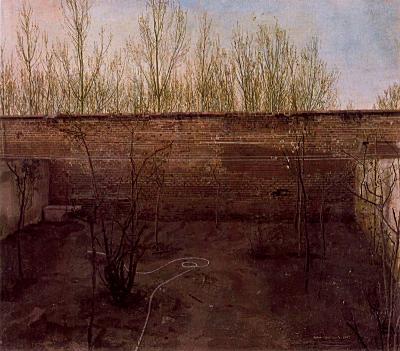
Antonio Lopez Garcia
b. Jan. 6, 1936
_______________________
six from nomadic slant
Camille Martin
ditch
by the time i get to the border, i’ve already forgotten
why i came. must be for its own sake, for the point now
seems moot. anyway, it’s a good place to camp,
and i can still see out my own window. it might be just
a fantasy that the panorama appears broader here,
or that i can quibble as long as i like. it would be a different
matter to change the story, brutish but at least not yet
malevolent. i think i know my disease, but really
i only catalogue the symptoms. for example,
my eyes being the exact shade of the tree bark they invert.
and my thoughts having no passport, no home, just
background noise to accompany their inevitable mistakes.
here i can fail the rorschach out my window every
time, giving dubious answers to indefinite
...(more)
ditch
a Canadian online poetry magazine celebrating the innovative, the non-conforming, the radical, the alternative, the surreal, the avant-garde, the non-linear, the abstract, the experimental.
.....................................................
ditch, anthology 1 (canadian innovative poets)
an anthology of some of the most innovative and exciting poetry that has appeared on the ditch, website
_______________________
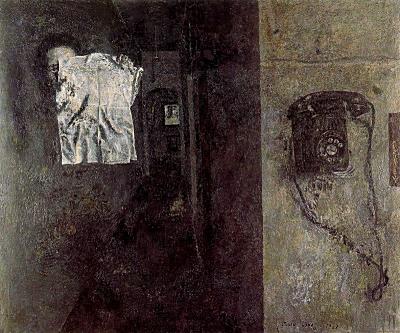
Antonio Lopez Garcia
_______________________
Robert Kelly on Brooklyn
part 4
Just where the parkway strikes Flatbush Avenue, itself spinning off the roundabout of the plaza, stands the strange white geometry of the Brooklyn Public Library, the cathedral from which all the branch libraries I knew were but mission chapels among the infidel. Here was the source. White, huge, triumphalist in design, with gilded relief figures over its concave modernist front, it had and has the kind of belated grandeur that reminds us of what Mussolini tried in Rome. Still, I loved the building, inside and out, and the Museum just east of it, and Prospect Park with its zoo just across the avenue and down a ways. This was the center of civilization as I, or Brooklyn, knew it.
But it wasn’t my real center. The center was home, always. The place where you sleep. Where your mother calls you. Where your father plays Vaughan Monroe on the radio. Where your sister wonders whether we are Jews or Italians – there are no other kinds of people. The beautiful stifling railroad flat, the airless ordinary. Your life. When you're home, you can go anywhere. ...(more)
parts 1 2 3
_______________________
Boog Reader 4 [pdf]
48 NYC poets - 24 DC poets
_______________________
BOMB 110/Winter 2010
_______________________
Making the Translator Visible
a series of interview/profiles at Three Percent
_______________________

Dante in the Dark Wood
Gustave Doré
b. Jan. 6, 1832
In the midway of this our mortal life,
I found me in a gloomy wood, astray
Gone from the path direct: and e'en to tell,
It were no easy task, how savage wild
That forest, how robust and rough its growth,
Which to remember only, my dismay
Renews, in bitterness not far from death.
Yet, to discourse of what there good befel,
All else will I relate discover'd there.
- Dante Alighieri, The Divine Comedy
_______________________
The Walker
spurious
(....)There's Walser, too, the patron saint of walkers. Walser walking in the Swiss Alps. Walker who'd long since devoted his time to being mad, rather than writing: he knew his priorities. He was mad, and the mad walked. And one day - 60 years ago - they found him dead in the snow. He'd walked his way to death. Which is to say, says W., he'd met death on his own terms, far from his mental asylum. And that's exactly his point, W. says. The walker meets the world on his own terms. The walker - the slow walker - meets the world according to his measure, W. says....(more)
_______________________
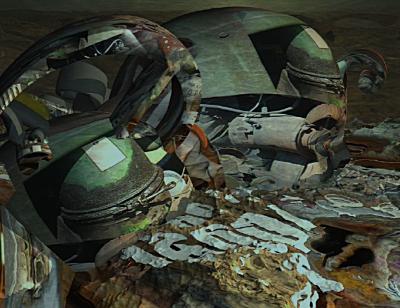
for this moment, at least for this moment
Peter Cicariello
experiment-o issue 2 [pdf]
on line annual pdf magazine from AngelHousePress
_______________________
Bad theory
Mike Johnduff
Working notes
Almost forty years now of theory widely practiced in the US--and we only have a general sense of what theory is. It's a notorious problem that is actually its own solution: theory is one of the only fields where knowledge doesn't know what it has to be. So perhaps we shouldn't ever have to know what it is. Neverthless, it has assumed certain shapes. These too should not be avoided or combated in the name of preserving continual micro-self-differentiation. Rather, bad elements should be identified, isolated, and clipped off or left alone to wither. Here then is what might constitute "bad theory," which we might just hesitate before putting to work yet again, in another empty denunciation of what have you:.......(more)
_______________________
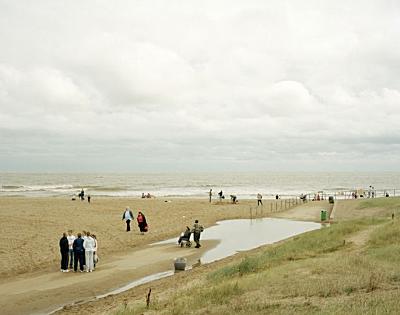
Skegness, Lincolnshire
We English
Simon Roberts
Visura Magazine
_______________________
Languages
Carl Sandburg
b. Jan. 6, 1878
There are no handles upon a language
Whereby men take hold of it
And mark it with signs for its remembrance.
It is a river, this language,
Once in a thousand years
Breaking a new course
Changing its way to the ocean.
It is mountain effluvia
Moving to valleys
And from nation to nation
Crossing borders and mixing.
Languages die like rivers.
Words wrapped round your tongue today
And broken to shape of thought
Between your teeth and lips speaking
Now and today
Shall be faded hieroglyphics
Ten thousand years from now.
Sing--and singing--remember
Your song dies and changes
And is not here to-morrow
Any more than the wind
Blowing ten thousand years ago.
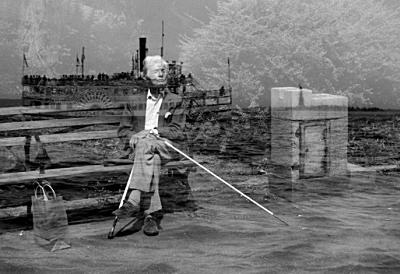
Options
Second Site
Ken Van Sickle
Visura Magazine Issue 7
Ken Van Sickle Photo
_______________________
Davenport’s excursionists elude both the egotistical sublime of the Romantic promeneur solitaire and the connoisseurship of the flâneur. They are neither self-tormenting prodigals nor persecuted exiles. Congenial, curious, and sanguine, they are lovers whose erotic anticipation fosters a broader receptivity to the sights along the way. Therapeutic models of secular pilgrimage are renounced nostrums. Walking is not an anodyne but a mode of engagement. It is a social act and, as de Certeau and Situationist Guy Debord propose, a possible mode of collective dissent.
- André Furlani, Guy Davenport: postmodern and after
I love that. The ideogrammatic intertwinings, the stone-cut concision. Even without being entirely convinced by the asyndeton / walk analogy. If anything walking allows one to insert oneself into a continuum, a measure, a stretch. Alert, one knows what lies between here and here. The traverse is count’d up, mark’d off, its details (moving, no nouns in nature) slow’d by one’s moving through (the smear of phenomena). Though: ambling, slowness, routine (associating walking with the quotidian, the “same” paths). Sidling along parallel to other refusals: the “current” (au courante, that runningness, that keeping up), the “news” (that perpetual rehash heighten’d by daily donned breathlessness), the careening careerism, the exertions of constant publishing . . .
John Latta
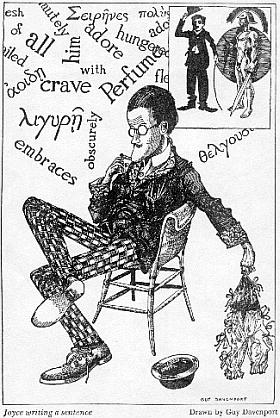 Joyce writing a sentence
Guy Davenport
(November 23, 1927 – January 4, 2005)
Guy Davenport on Ludwig Wittgenstein
Wittgenstein did not argue; he merely thought himself into subtler and deeper problems The record which three of his students have made of his lectures and conversations at Cambridge discloses a man tragically honest and wonderfully, astoundingly absurd. In every memoir of him we meet a man we are hungry to know more about, for even if his every sentence remains opaque to us, it is clear that the archaic transparency of his thought is like nothing that philosophy has seen for thousands of years. It is also clear that he was trying to be wise and to make others wise. He lived in the world, and for the world. He came to believe that a normal, honest human being could not be a professor. It is the academy that gave him his reputation of impenetrable abstruseness; never has a man deserved a reputation less. Disciples who came to him expecting to find a man of incredibly deep learning found a man who saw mankind held together by suffering alone, and he invariably advised them to be as kind as possible to others. He read, like all inquisitive men, to multiply his experiences. He read Tolstoy (always getting bogged down) and the Gospels and bales of detective stories. He shook his head over Freud. When he died, he was reading Black Beauty. His last words were: "Tell them I've had a wonderful life."
Davenport on google books
Da Vinci's bicycle: ten storiesObjects on a table: harmonious disarray in art and literature
The Hunter Gracchus: And Other Papers on Literature and Art Twelve stories The geography of the imagination: forty essays
A balance of quinces: the paintings and drawings of Guy Davenport
A Table of Green Fields: Ten Stories
The Logia of Yeshua: The Sayings of Jesus
translated by Guy Davenport, Benjamin Urrutia 7 Greeks
translations by Guy Davenport
.....................................................
Learning from Lexington
Marjorie Perloff on Davenport
.....................................................
An Interview of Guy Davenport by Bernard Hoepffner "Necessary fiction" means merely that if I am writing about an historical figure (Vladimir Tatlin, Kafka, Walser, Pausanias, C. Musonius Rufus) I supply weather, rooms, samovars, Greek dust, Italian waiters, and so on, not in the historical record but plausible. It does NOT mean that I give fictional accounts.
Prose: one writes, or is written. (Barthes's great subject: that our phrases exist so extensively that an author merely arranges them).
I approach writing with the sense that my words must be chosen and arranged with care, as we live in a world of abused and meaningless words. I think it can be said that I write in order to use words in my way, for certain effects, rather than for any programmatic purpose (psychology, drama, politics, thematics).
What I write about is therefore all but gratuitous. I have enough sense of anecdote to make a narrative. But the narrative is the stage.
The prime use of words is for imagery: my writing is drawing.
Gerard Manley Hopkins said that if he could live long enough he could find a use in a poem for every word of English. Good writers can make words mean what they want them to. Henry James, for instance, works with the tones (and overtones) of ordinary words, controlling them with idioms. His style is completely colloquial, like Hawthorne's.
I couldn't write a novel: I'd use up all the words I would have for it by Chapter 3, and couldn't go on.
_______________________
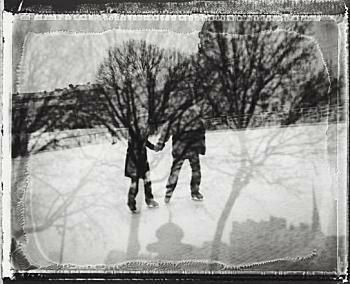
Guillaume Zuili 1 2 3
_______________________
Rethinking Education as the Practice of Freedom:
Paulo Freire and the Promise of Critical Pedagogy
Henry A. Giroux
Paulo was a cosmopolitan intellectual, who never overlooked the details in everyday life and the connections the latter had to a much broader, global world. He consistently reminded us that political struggles are won and lost in those specific yet hybridized spaces that linked narratives of everyday experience with the social gravity and material force of institutional power. Any pedagogy that called itself Freirean had to acknowledge the centrality of the particular and contingent in shaping historical contexts and political projects. Although Freire was a theoretician of radical contextualism, he also acknowledged the importance of understanding the particular and the local in relation to larger, global and cross-national forces. For Freire, literacy as a way of reading and changing the world had to be reconceived within a broader understanding of citizenship, democracy and justice that was global and transnational. Making the pedagogical more political in this case meant moving beyond the celebration of tribal mentalities and developing a praxis that foregrounded "power, history, memory, relational analysis, justice (not just representation), and ethics as the issues central to transnational democratic struggles."...(more)
_______________________
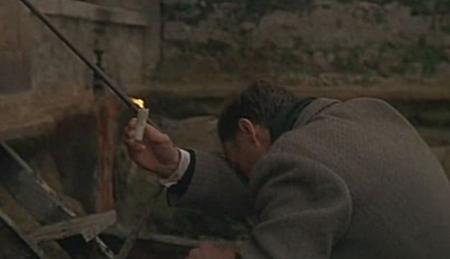
Nostalgia
(Andrei Tarkovsky)
youtube
_______________________
The Play’s the Thing
Michael Bérubé reviews On The Origin Of Stories: Evolution, Cognition, and Fiction by Brian Boyd
On the Origin of Stories is a fascinating book, even a necessary book. At its best, evocriticism can help to reorient the arts and humanities, renewing (or, in some benighted quarters, sparking) our appreciation for the creative works of human minds and hands, and leading humanists to take a fresh look at the rich evolutionary record. But it will accomplish this, I suspect, only if it is complementary to, and not sweepingly dismissive of, the intellectual traditions humans have devised for the study of human cultures.
via BlurryYellow
_______________________

Julius Shulman
1910-2009
Interview with Julius Shulman
1990
AMERICANSUBURB X
"A photograph is a design in which you assemble thoughts in your mind."
_______________________
The decade's top 10 quotations
David Sirota
(....)
8. "Keep your government hands off my Medicare." -- Anti-healthcare protester at an August 2009 congressional town hall meeting in South Carolina -- the single most succinct sign that our country has become an idiocracy.
(....)
6. "As we know, there are known knowns. There are things we know we know. We also know there are known unknowns. That is to say, we know they're some things we do not know. But there're also unknown unknowns; the ones we don't know we don't know." -- Defense Secretary Donald Rumsfeld on Feb. 12, 2002, effectively telling us that the government had no idea what it was doing by invading Iraq.
_______________________
US Attacks in Pakistan Killed 700 Civilians in 2009
_______________________
Harper's arrogance reflects our weakness
Murray Dobbin
For a political culture that puts a higher value on deciding what big-screen TV to buy than it does on thinking about the direction of the country, these things just don't add up to much. They amount to a side-show and ironically all the political parties to some extent get blamed for the so-called "political games."
While this reflects a long-term weakness of our democratic institutions it is the short-term that is more troublesome. Given the danger the country faces from the Harper dictatorship there should be emergency meetings being held in Ottawa with all the national unions, the churches, the Council of Canadians, national environmental organizations and other civil society groups whose job it is to create a political culture in which this kind of fascist-minded government simply could not operate.
Harper's vicious politics were in some ways inevitable. If we allow our political culture to erode and weaken into little more than a side-show to consumerism, it is just a matter of time before the forces of reaction seize the moment and permanently change the country....(more)
.....................................................
Every conservative blogger in Canada who can type the word “democracy” with a straight face this month, without blushing in humiliation, should be put in stocks and pelted with the thirty two bills their Prime Minister has just killed because Parliament and its committee have become (languid wave of hand) an annoyance.
-
Stageleft
_______________________
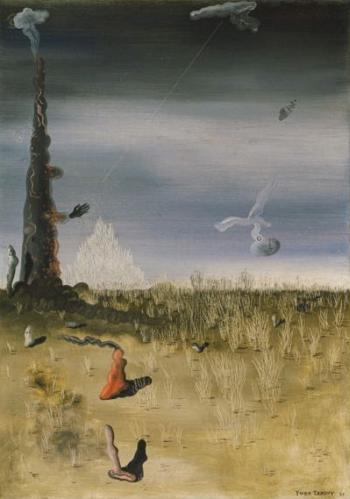
Extinction of Useless Lights
1927
Yves Tanguy
b. Jan. 5, 1900
_______________________
The Pictures of War You Aren't Supposed to See
Chris Hedges
Look beyond the nationalist cant used to justify war. Look beyond the seduction of the weapons and the pornography of violence. Look beyond Barack Obama’s ridiculous rhetoric about finishing the job or fighting terror. Focus on the evil of war. War begins by calling for the annihilation of the others but ends ultimately in self-annihilation. It corrupts souls and mutilates bodies. It destroys homes and villages and murders children on their way to school. It grinds into the dirt all that is tender and beautiful and sacred. It empowers human deformities—warlords, Shiite death squads, Sunni insurgents, the Taliban, al-Qaida and our own killers—who can speak only in the despicable language of force. War is a scourge. It is a plague. It is industrial murder. And before you support war, especially the wars in Iraq and Afghanistan, look into the hollow eyes of the men, women and children who know it. ...(more)
_______________________
Group Gives Up Death Penalty Work
Adam Liptak
Last fall, the American Law Institute, which created the intellectual framework for the modern capital justice system almost 50 years ago, pronounced its project a failure and walked away from it.(....)
...the institute voted in October to disavow the structure it had created “in light of the current intractable institutional and structural obstacles to ensuring a minimally adequate system for administering capital punishment.”
That last sentence contains some pretty dense lawyer talk, but it can be untangled. What the institute was saying is that the capital justice system in the United States is irretrievably broken.
A study commissioned by the institute said that decades of experience had proved that the system could not reconcile the twin goals of individualized decisions about who should be executed and systemic fairness. It added that capital punishment was plagued by racial disparities; was enormously expensive even as many defense lawyers were underpaid and some were incompetent; risked executing innocent people; and was undermined by the politics that come with judicial elections....(more)
_______________________
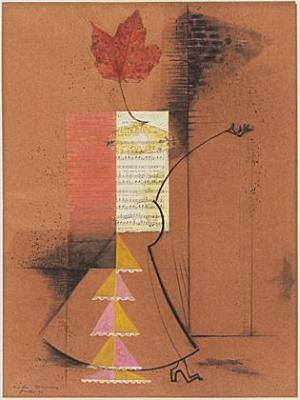 Street Singer
André Masson
b.4 January 1896
_______________________
It's as if America wanted to go to heaven so badly that it created its own version of it, with prices accessible to most everyone, improving on Christianity by insuring salvation to anyone for a nominal fee. The mall, a pervasive expression of the same sensibility, provides an environment where the self, transformed from pilgrim or scientist to consumer, can achieve happiness, the realization of dreams, by the purchase of commodities. Thus the original quest for salvation has been transformed into one for consumption without end through the mechanisms of the science, technology and capitalist economy created by the modern cogito: "I consume therefore I am."
Nietzsche at the Mall: Deconstructing the Consumer
Daniel R. White and Gert Hellerick ctheory
God is a magnification of the Christian ego into the absolute, with all the attributes of morality - "community," "good and just" - foisted upon Him, creating an irreconcilable opposition to "the world" - read other peoples and cultures, nature, woman, the devil, evil, the Iraqis - which are, therefore, the proper objects of "salvation," read conquest and exploitation. But the oppositions are artificial in the first place, and the Christian privileging of one half - the "good" half - is wholly chimerical. This would not be so bad, if the Christians, and Eurocentrists generally, understood that the creation and selective privileging of oppositions is no more than a peculiar kind of play, invented by homo sapiens; this realization, however, creates not the Apollonian wise man but the Dionysian reveller, homo ludens. Of course, as Nietzsche's Philosophy in the Tragic Age of the Greeks clearly indicates, the Apollonian and Dionysian are themselves correlatives in the game of Western culture, separated at our peril. The Christian ego is not only posited as God, in Nietzsche's view, but also as the soul, insuring not only that the world is "meant" for Christian colonization, but also that the converted are insured eternal life, independent of the play of time and change. According to Nietzsche, the absolutization of God is internalized by the Christians in a kind of meta-idolatry: first a super entity is fabricated and set up as the ontological foundation of all existence, then the Father in Heaven is interjected as the soul in the body, or the ghost in the machine, in moral terms as the superego or conscience. Thus man comes to live under the shadow of God and so to accept the limits that this imposes upon him: God hands down the law. As Nietzsche argues in On the Genealogy of Morals,
All instincts that do not discharge themselves outwardly turn inward-this is what I call the internalization (Verinnerlichung) of man: thus it was that man first developed what was later called his "soul." The entire inner world, originally as thin as if it were stretched between two membranes, expanded and extended itself, acquired depth, breadth, and height, in the same measure as outward discharge was inhibited. (II, sec. 16)
Thus the self or soul is created through constraint upon "instincts," which would otherwise be turned outward. Here we can see Nietzsche's downward and upward paths juxtaposed, for as he takes apart the inner life of the soul via genealogy, he suggests the expansion of "instinct" outward. This latter idea needs clarification, for it can be misinterpreted as an excuse for imperialism, but it can also be seen as the play of creativity unconstrained by the idols of metaphysics and the seductions of empire. ...(more)
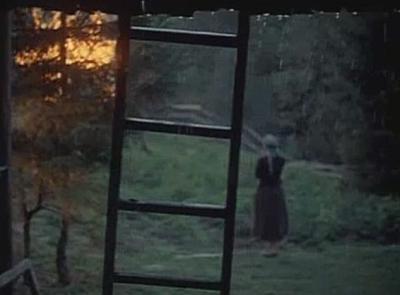
still from The Mirror
Andrei Tarkovsky
youtube
Sculpting in Time
Andrei Tarkovski
aaaarg - free reg. req.
_______________________
The Arts and Death: A Fugue for Sidney Cox
William Bronk
(....)
I think always how we always miss it; how the dead
have not been final, and life has always required
to be stated again, which is not ever stated.
It is not art's statements only, not
what we try to say by music, not the way
this picture sculptures sight itself
to see this picture--not by art alone
the aim is missed, and even least of all
by art (which tries a whole world at once,
a composition). No, it is in our terms,
the terms themselves, which break apart, divide,
discriminate, set chasms in that wide,
unbroken experience of the senses which
goes on and on, that radiation inward and out,
that consciousness which we divide, compare,
compose, make things and persons of, make forms,
make I and you. World, world, I am scared
and waver in awe before the wilderness
of raw consciousness, because it is all
dark and formlessness: and it is real
this passion that we feel for forms. But the forms
are never real. Are not really there. Are not.
I think always how we always miss the real.
There still are wars though all the soldiers fall.
We live in a world we never understand.
Our lives end nothing. Oh there is never an end.
...(more)
The "winter mind": William Bronk and American letters
Burt Kimmelman google books
William Bronk at PennSound
Selected poems
William Bronk
google books
_______________________

east side, detroit
(2008)
lost neighborhoods
the disappearing city
James D. Griffioen
via Joerg Colberg
_______________________
Literary Silence
Jono Schneider
Much has been said of the reader/writer relationship most recently that the reader is now seen as a co-creator in the work's meaning. But beyond that, reader and writer work in tandem, independently of one another, to make the work stand in the world. But the standing in the world the "having read" that exists between reader and writer, the "having read" that places the work in question (the question of the work that, now that the physical reading of the work is in the past, remains, all that remains of the work) is one of silent agreement: I write something (it is complete with me), you read something (it is complete with you), and the completion exists between us without our ever having spoken. We may meet, and we may even speak of what is between us (the work), but what we say is not the experience of the work, it is other than the work it is now what we have of the work, what we are of the work now that we have left it.
Literary Silence, then, is what I would call the thing missed in the translation, but the thing that always remains in the words themselves, what calls us back to the book, but which we cannot leave without. But we cannot say it. Even Bataille's words "I approach poetry, only to miss it" words that appear in the context of The Impossible, a story about the story that cannot be told are, in my usage of them, a misconstruing, because the story has disappeared in lieu of the aphorism, which, now missing its narrator, is language unhinged and made into the "anything" with which this essay began, where what is said is always said without limits. But these are the limits to which the writer of literature succumbs, regardless of his or her knowledge: "What I know of the book is what the book tells me, but what I cannot repeat -- or the book disappears."...(more)
VeRT Magazine {Issue # 7}
September 2002
_______________________
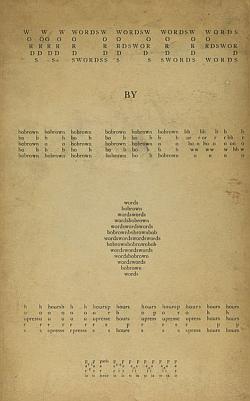
Words, by Bob Brown
1931
facsimile edition
Craig Saper
I BUT BEND MY FINGER IN A BECKON
AND WORDS BIRDS OF WORDS HOP ON
IT CHIRPING
Operating on words -gilding and gelding them
In a rather special laboratory equipped with
Micro and with scope -I anesthetize
Pompous, prolix, sesquipedalian, Johnsonian
Inflations like Infundibuliform
Only to discover by giving them a swift
Poke in the bladder they instantly inspissate
And whortle down the loud- writing funnel.
Experimentally pricking with a sterilized
needle
The centipedantic adjective Pseudepigraphous
I find it just goes Puff! and guiltily seeks
Sanctuary behind the dictionary.
All clearly classical words fray easily
The wooliest ones show undeniable traces of
Mouthy cotton. Weevil words bore.
Altiloquential ones when dropped in the
Specimen jar brimming with alcohol
Die torturously unhappy deaths from drowning
While wassail words run around the slippery rim
Making whoopee, shouting for a ducking
Coming out aglow to slip their warm little
Hands in mine with quaint curtsies from the
Lady ones and hearty "Thanks for the drink,
Old man," from their cheery red-cheeked mates
'Tis then I reach for the Laboratory Record and
Happily indite a new-found formula
WW -|- I = 1
(Words and I are one)
...(more)
via Al Filreis
Bob Brown at The PIP (Project for Innovative Poetry) Blog
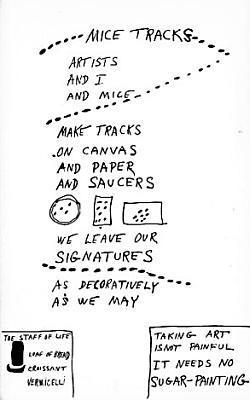
Bob Brown at ubuweb
_______________________
The Poetics of Disobedience
Alice Notley
For a long time I've seen my job as bound up with the necessity of noncompliance with pressures, dictates, atmospheres of, variously, poetic factions, society at large, my own past practices as well. For a long time--well in fact since the beginning, since I learned how to be a poet inside the more rebellious wing of poetry; though learning itself meant a kind of disobedience, so like most words the Dis word, the Dis form, cannot be worshipped either--and that would be an obedience anyway. I've spoken in other places of the problems, too, of subjects that hadn't been broached much in poetry and of how it seemed one had to disobey the past and the practices of literary males in order to talk about what was going on most literarily around one, the pregnant body, and babies for example. There were no babies in poetry then. How could that have been? What are we leaving out now? Usually what's exactly in front of the eyes ears nose and mouth, in front of the mind, but it seems as if one must disobey everyone else in order to see at all. This is a persistent feeling in a poet but staying alert to all the ways one is coerced into denying experience, sense and reason is a huge task. I recently completed a very long poem called Disobedience but I didn't realize that disobeying was what I was doing, what perhaps I'd always been doing until the beginning of the end of it, though the tone throughout was one of rejection of everything I was supposed to be or to affirm, all the poetries all the groups the clothes the gangs the governments the feelings and reasons....(more)
_______________________

photo - mw
_______________________
What We Are
William Bronk
What we are? We say we want to become
what we are or what we have an intent to be.
We read the possibilities, or try.
We get to some. We think we know how to read.
We recognize a word, here and there,
a syllable: male, it says perhaps,
or female, talent -- look what you could do --
or love, it says, love is what we mean.
Being at any cost: in the end, the cost
is terrible but so is the lure to us.
We see it move and shine and swallow it.
We say we are and this is what we are
as to say we should be and this is what to be
and this is how. But, oh, it isn’t so.
_______________________
What happened?!?
Dave Patterson
For over 200 years our ancestors worked and struggled to make Canada one of the bright spots on the world map - peaceful, democratic, progressive, prosperous, providing an ever-improving life for all of its people, a country consistently rated among the best in the world with the brightest of futures. And then something happened during the 1970s - although some things certainly continued progressing - technology, for instance, never stopped looking for and finding new and better ways of doing things - other things stopped progressing and started regressing. Instead of general living conditions for everyone getting better as the years went by, things started going backwards. Poorer jobs with poorer wages and less security for the average family instead of better jobs with more money and security. Regressing social safety nets, our national health care program getting attacked instead of strengthened. Less safety and honesty and civility throughout our land, less democracy, less openness and accountability from our politicians, less honesty and intelligence and more propaganda and superficiality from our media, a people more and more becoming petty and mean and angry and bitter and grasping rather than happy and content and generous and enjoying the fruits of a life well-lived. From wherever ancestors go, ours must be wondering what happened ... ...(more)
_______________________
c. wright mills:
power, craftsmanship, and private troubles and public issues
Mark K. Smith
via Thivai Abhor
the encyclopaedia of informal education _______________________

"This School is Ready for the H-Bomb"
(1954)
Oliver F. Atkins
(1917-1977)
_______________________
Appearances
John Berger
Essay on Photography and ways of reading image
aaaarg
The Civil Contract of Photography
Ariella Azoulay
How photography has created a new form of citizenship
aaaarg - free reg. req. The Camera as a Weapon: On Abu Ghraib and Related Matters
Carsten Bagge Laustsen
Journal for Cultural Research (Apr. 2008) Vol. 12 No. 2
aaaarg - free reg. req.
_______________________
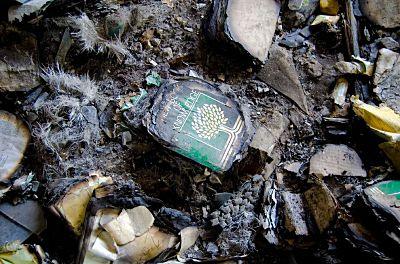
new book of knowledge
detroit public schools book depository
James D. Griffioen
_______________________
There Is Ignorant Silence in the Center of Things
William Bronk
What am I saying? What have I got to say?
As though I knew. But I don’t. I look around
almost in a sort of despair for anything
I know. For anything. Some mislaid bit.
I must have had it somewhere, somewhere here.
Nothing. There is silence here. Were there people, once?
They must have all gone off. No, there are still
people, still a few. But the sound is off.
If we could talk, could hear each other speak
could we piece something, could we learn and teach,
could we know?
Hopeless. Off in the distance, busyness.
Something building or coming down. Cries.
Clamor. Fuss at the edges. What? Here,
at the center — it is the center? — only the sound
of silence, that mocking sound. Awful. Once,
before this, I stood in an actual ruin, a street
no longer a street, in a town no longer a town,
and felt the central, strong suck of it, not
understanding what I felt: the heart of things.
This nothing. This full silence. To not know.
courtesy of Waggish

Helsinki
Pentti Sammallahti
2002 1 2 3
Greg Fallis on Pentti Sammallahti
Utata: Tribal Photography
via Andrew Abb, Plus9 (-15) Plus? - neat links from 2009
_______________________
Short Ode to Morningside Heights
Rachel Wetzsteon
Convergence of worlds, old stomping ground,
comfort me in my dark apartment
when my latest complaint shrinks my focus
to a point so small its hugely present
but barely there, and I fill the air
with all the spiteful words I spared the streets.
(....)
Things are and are not solid.
As Opera Night starts at Caffe Taci,
shapes hurry home with little red bags,
but do they watch the movies they hold
or do they forego movies for rooftops
where they catch Low’s floating dome in the act
of always being about to fly away?
Ranters, racers, help me remember
that the moon-faced fountain’s the work of many hands,
that people linger at Toast long after we’ve left.
And as two parks frame the neighborhood—
green framing gray and space calming clamor—
be for me, well-worn streets, a context
I can’t help carrying home, a night fugue
streaming over my one-note how, when, why.
Be the rain for my barren indoor cry.

Rachel Wetzsteon
1967 - 2009
In Memory, and Admiration, of Rachel Wetzsteon
Adam Kirsch
new republic
Sakura Park
Rachel Wetzsteon
The park admits the wind,
the petals lift and scatter
like versions of myself I was on the verge
of becoming; and ten years on
and ten blocks down I still can't tell
whether this dispersal resembles
a fist unclenching or waving goodbye.
...(more)
_______________________
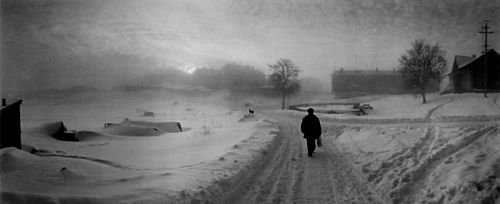
Solovki, White Sea
Russia, 1992
Pentti Sammallahti
_______________________
of wood
JA Tyler
(....)
His words make logs from trees. His words make him a wooden statue, a Trojan horse cased in framing and opened only when she is sleeping, pouring out all his failures into her head. She sleeps and hears nothing. She sleeps and does not dream. She sleeps and there are clouds.
Inside he says I am more than just this wood. But it is not true. He is wooden heart and wooden ladders, his lungs are paper-thin shreds and his fingernails are collections of splintered wood. Every bit of him is ready to light ablaze.
She sees in the clouds a can of gasoline. She sees matches. She sees tinder. She sees light radiating from underneath coal glow, white hot clouds. Hears nothing of him as he goes on saying Make me into anything you want. She doesn’t want to make anything. She wants to sleep without dreams, or to dream of sleeping.
...(more)
Necessary Fiction
_______________________
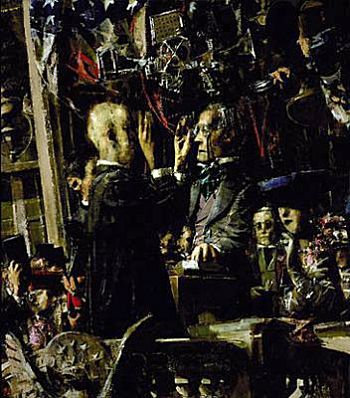
Inauguration
1956-1958
Jack Levine
b. Jan. 3, 1915
_______________________
Canada's Stolen Democracy: Welcome to 2010
James Laxer
Stephen Harper has an aversion to Parliament. When the House of Commons sits, he and his ministers have to answer questions. The body language of the Prime Minister and his ministers, and their surly, disrespectful attitude to those on the other side of the aisle tells the story.
The styles vary. When Harper stands up to answer a question, he does up his jacket in the manner of a butcher securing his apron before he gives an animal the chop. Peter MacKay adopts an unctuous manner at the start of an answer and concludes by sliming an opponent. John Baird bullies and spews contempt. And Jason Kenney plays the jackal, preferring to sink his teeth into dead meat left behind by the others. He’s the one who claimed that York University is such a hotbed of anti-semitism that what goes on there can be compared to “pogroms”. As the grandson of a rabbi who has taught there for the past 38 years, I guess I’m lucky I’m still alive.
The members of the Conservative cabinet are not very bright guys. And they don’t see why they should have to be subjected to cross-examination. Replying to critics is not their strong suit. When the questioning gets too hot as it did before Christmas on the Afghan prisoner abuse issue they don’t shoot the messengers, they just shut them up.(....)
When the history of this era is written years from now, the story is likely to be that of a not very talented gang with values distant from those of the Canadian mainstream, holding onto office longer than they should have because the opposition couldn’t figure out how to unite to deal with them. Some will bear more responsibility for this sorry state of affairs than others.
Just don’t blame the large majority of Canadians who continue to have the sense to reject Harper and his boys, medals notwithstanding. Yes, Canadians care about the economy, the environment, and the prisoner abuse scandal. They are concerned about the reputation of their country in the rest of the world. Give them a way to rid themselves of Harper in the next election and the people will do the rest....(more)
.....................................................
Whatever happens in the coming months, one reality is inescapable. In taking politics to a different, hyper-controlling and partisan level, the Prime Minister is creating a dangerous legacy his successors will gratefully accept before turning it to their benefit.
Even if Conservatives are more comfortable than other Canadians with Harper's dark democracy, they along with the rest of us should be very afraid of what will happen when, as it will, the political worm turns.
- James Travers
.....................................................
The Short Parliament
Andrew Coyne
So, rather than submit himself to the inquiries of elected parliamentarians, the King will dismiss Parliament, in the grand tradition of kings past. The question is: what will Parliament do now? If historical precedent is any guide, it should meet anyway. Let those MPs who wish to do the people’s business convene on the usual timetable, and let those with other loyalties disport themselves as they may.
If MPs are barred at the doors to Parliament — and wouldn’t that be an interesting scene — let them meet somewhere else. A tennis court would do nicely....(more)
The Real Canadian Coup d'Etat
James Bow
_______________________
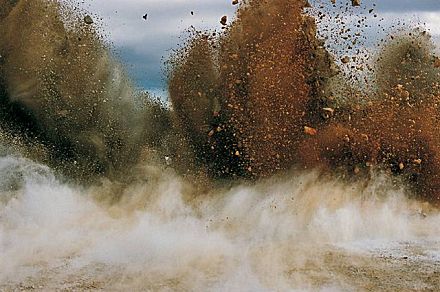
A Bird / Blast
Naoya Hatakeyama
2006
L.A.Galerie Lothar Albrecht
via Marc Feustel
eyecurious
_______________________
How to Build a Universe That Doesn't Fall Apart Two Days Later
Philip K. Dick, 1978
It was always my hope, in writing novels and stories which asked the question "What is reality?", to someday get an answer. This was the hope of most of my readers, too. Years passed. I wrote over thirty novels and over a hundred stories, and still I could not figure out what was real. One day a girl college student in Canada asked me to define reality for her, for a paper she was writing for her philosophy class. She wanted a one-sentence answer. I thought about it and finally said, "Reality is that which, when you stop believing in it, doesn't go away." That's all I could come up with. That was back in 1972. Since then I haven't been able to define reality any more lucidly. (....)
So I ask, in my writing, What is real? Because unceasingly we are bombarded with pseudo-realities manufactured by very sophisticated people using very sophisticated electronic mechanisms. I do not distrust their motives; I distrust their power. They have a lot of it. And it is an astonishing power: that of creating whole universes, universes of the mind. I ought to know. I do the same thing. It is my job to create universes, as the basis of one novel after another. And I have to build them in such a way that they do not fall apart two days later. Or at least that is what my editors hope. However, I will reveal a secret to you: I like to build universes which do fall apart. I like to see them come unglued, and I like to see how the characters in the novels cope with this problem. I have a secret love of chaos. There should be more of it. Do not believe—and I am dead serious when I say this—do not assume that order and stability are always good, in a society or in a universe. The old, the ossified, must always give way to new life and the birth of new things. Before the new things can be born the old must perish. This is a dangerous realization, because it tells us that we must eventually part with much of what is familiar to us. And that hurts. But that is part of the script of life. Unless we can psychologically accommodate change, we ourselves begin to die, inwardly. What I am saying is that objects, customs, habits, and ways of life must perish so that the authentic human being can live. And it is the authentic human being who matters most, the viable, elastic organism which can bounce back, absorb, and deal with the new. (....)
The basic tool for the manipulation of reality is the manipulation of words. If you can control the meaning of words, you can control the people who must use the words. George Orwell made this clear in his novel 1984. But another way to control the minds of people is to control their perceptions. If you can get them to see the world as you do, they will think as you do. ... Our memories are spurious, like our memories of dreams; the blank are filled in retrospectively. And falsified. We have participated unknowingly in the creation of a spurious reality, and then we have obligingly fed it to ourselves. We have colluded in our own doom....(more)
via Thivai Abhor
_______________________

Cows, Sailing Boat and Figures
1914
August Macke
b. 3 January 1887
_______________________
City That Does Not Sleep
Federico García Lorca
Translated by Robert Bly
In the sky there is nobody asleep. Nobody, nobody.
Nobody is asleep.
The creatures of the moon sniff and prowl about their cabins.
The living iguanas will come and bite the men who do not dream,
and the man who rushes out with his spirit broken will meet on the
street corner
the unbelievable alligator quiet beneath the tender protest of the
stars.
Nobody is asleep on earth. Nobody, nobody.
Nobody is asleep.
In a graveyard far off there is a corpse
who has moaned for three years
because of a dry countryside on his knee;
and that boy they buried this morning cried so much
it was necessary to call out the dogs to keep him quiet.
Life is not a dream. Careful! Careful! Careful!
We fall down the stairs in order to eat the moist earth
or we climb to the knife edge of the snow with the voices of the dead
dahlias.
But forgetfulness does not exist, dreams do not exist;
flesh exists. Kisses tie our mouths
in a thicket of new veins,
and whoever his pain pains will feel that pain forever
and whoever is afraid of death will carry it on his shoulders.
...(more)
_______________________

Pentti Sammallahti

A New Generation
1892
Jan Toorop
_______________________
from
New Year Canticles
George Szirtes
(....)
3.
You think of your children in the early light
of the new era. You think of birds in flight.
You think of a cup in the kitchen in the broad
sunlight of mid November, of the faint noise of the road.
You think of the rhetoric of time
as a faintly bombastic ticking. You think of buds
ticking away in the branch under the rime.
The emblematic delicacy of soap suds.
4.
And the notion of an uninterrupted passage
towards happiness, the joy of the unkissed moment
waiting to fly past you, reassuringly off-message,
like a ludicrous, airborne, angelic monument,
Cupid on a bender, a sweet urgent gust
of well-being. Love among the just.
...(more)
_______________________

W. Eugene Smith
1918-1978
_______________________
Perhaps the World Ends Here
Joy Harjo
The world begins at a kitchen table. No matter what, we must eat to live.
The gifts of earth are brought and prepared, set on the table. So it has been since creation, and it will go on.
We chase chickens or dogs away from it. Babies teethe at the corners. They scrape their knees under it.
It is here that children are given instructions on what it means to be human. We make men at it, we make women.
At this table we gossip, recall enemies and the ghosts of lovers.
Our dreams drink coffee with us as they put their arms around our children. They laugh with us at our poor falling-down selves and as we put ourselves back together once again at the table.
This table has been a house in the rain, an umbrella in the sun.
Wars have begun and ended at this table. It is a place to hide in the shadow of terror. A place to celebrate the terrible victory.
We have given birth on this table, and have prepared our parents for burial here.
At this table we sing with joy, with sorrow. We pray of suffering and remorse. We give thanks.
Perhaps the world will end at the kitchen table, while we are laughing and crying, eating of the last sweet bite.
Joy Harjo blogs at Poetic Adventures in the Last World
_______________________

Breach
Richard Mosse
_______________________
Poems from The Holy Forest
Robin Blaser
EPC
Image Nation 5 (erasure
Robin Blaser
(1925-2009)
as the image wears away
there is a wind in the heart
the translated men
disappear into what they have
translated
rocking ihe heart a childish man
entangles an absence a still-life
at the edge of his body
erasing the body of those opposites
who are companions
and also horizons in one another's
eyes at the ends of the world
the words do not end but come back
from the adventure
the body is at the edge
of their commotion
the nonsense
the marvellous clarity
in the pool of the
heart
we quarrel over the immortal Word,
many times one falls out of the mortal
there suddenly the missing outward
journey
o we do in all things
walk contrary to the world
a Nervalian movement of
astonishment an arm around
a hollyhock or foxglove,
as if we dressed in them,
a flowered man the bees
disturb the stillness seeking
sweetness in the pockets
an art as natural as lunch poems
or an extravagant speaking out of
the gnostic horse's mouth
a translation of oneself into the Other
is
so
delicately
perched among words
this techne- binding the heart
like small poems read from
vast stages the images of the war
in Vietnam burn up out of the
words,
where they are not
added to the real
but compose it
...(more)
The Holy Forest
Collected Poems of Robin Blaser
Revised and Expanded Edition.
Edited by Miriam Nichols. Foreword by Robert Creeley. With a New Afterword by Charles Bernstein university of california press
_______________________
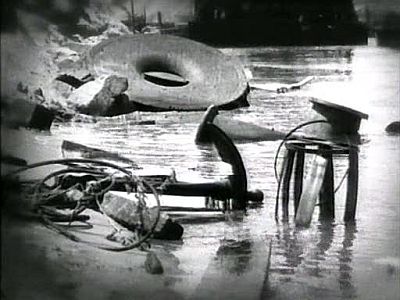
The Salvation Hunters
Josef von Sternberg
1925
via Matthew Flanagan
Landscape Suicide
_______________________
Garlic and sapphires in the mud
Clot the bedded axle-tree.
The trilling wire in the blood
Sings below inveterate scars
Appeasing long forgotten wars.
The dance along the artery
The circulation of the lymph
Are figured in the drift of stars
Ascend to summer in the tree
We move above the moving tree
In light upon the figured leaf
And hear upon the sodden floor
Below, the boarhound and the boar
Pursue their pattern as before
But reconciled among the stars.
At the still point of the turning world. Neither flesh nor fleshless;
Neither from nor towards; at the still point, there the dance is,
But neither arrest nor movement. And do not call it fixity,
Where past and future are gathered. Neither movement from nor towards,
Neither ascent nor decline. Except for the point, the still point,
There would be no dance, and there is only the dance.
I can only say, there we have been: but I cannot say where.
And I cannot say, how long, for that is to place it in time.
The inner freedom from the practical desire,
The release from action and suffering, release from the inner
And the outer compulsion, yet surrounded
By a grace of sense, a white light still and moving,
Erhebung without motion, concentration
Without elimination, both a new world
And the old made explicit, understood
In the completion of its partial ecstasy,
The resolution of its partial horror.
Yet the enchainment of past and future
Woven in the weakness of the changing body,
Protects mankind from heaven and damnation
Which flesh cannot endure.
-
T.S. Eliot, Burnt Norton, Four Quartets
_______________________
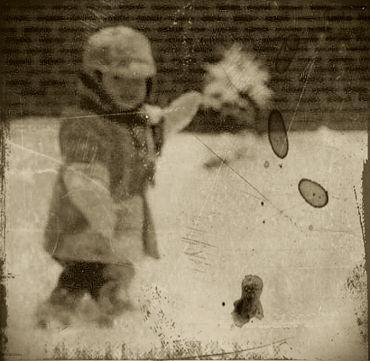
myself c.1953
some time before I started worrying
about acquiring a mind of winter
_______________________
“It is a little embarrassing, that after 45 years of research and study, the best advice I can give to people is to try to be a little kinder to each other.”
- Aldous Huxley via Wirearchy
|


 Janus Head
Janus Head

 The Age of Briggs & Stratton
The Age of Briggs & Stratton



























































 There is, for good reason, a lot of enthusiasm across the country as the groundswell against Stephen Harpers' cynical shuttering of Parliament continues to grow. The prime minister from hell has gotten away with so much -- and the opposition is so weak that any indication of genuine public disgust at his continuing demonstration of contempt for democracy is a welcome sign. And everyone who cares about the country should be taking part in the new movement for democracy.
There is, for good reason, a lot of enthusiasm across the country as the groundswell against Stephen Harpers' cynical shuttering of Parliament continues to grow. The prime minister from hell has gotten away with so much -- and the opposition is so weak that any indication of genuine public disgust at his continuing demonstration of contempt for democracy is a welcome sign. And everyone who cares about the country should be taking part in the new movement for democracy.